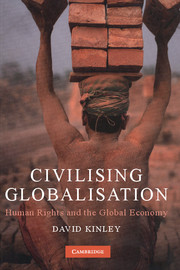5 - Civilising globalisation ahead
Published online by Cambridge University Press: 05 June 2012
Summary
Introduction
The Earth is one but the world is not. We all depend on one biosphere for sustaining our lives. Yet each community, each country, strives for survival and prosperity with little regard for its impact on others. Some consume the Earth's resources at a rate that would leave little for future generations. Others, many more in number, consume far too little and live with the prospect of hunger, squalor, disease, and early death.
These are the opening words of the Brundtland Commission's Report published in 1987. They remain as true today as they did then. Our social as well as physical environments sustain us, and the state of their upkeep and care directly determines our communal and individual health and well-being. The Brundtland Report placed great importance on the global economy – how it is managed, as well as what, and how much, it produces; on global food security; on the political interdependency of governance, security, environmental protection and economic and social development; on the normative authority of human rights; and on the practicability of legal and institutional structures to help realise these outcomes and objectives. Even though the Brundtland Commission's perspective on these matters was primarily an environmental one, the themes it traversed of the interdependency of economic and social imperatives, the mediation of politics and law, and the over-arching objectives of fairness and sustainability, are echoed in this book with its avowedly human rights perspective.
- Type
- Chapter
- Information
- Civilising GlobalisationHuman Rights and the Global Economy, pp. 204 - 239Publisher: Cambridge University PressPrint publication year: 2009
References
- 1
- Cited by



